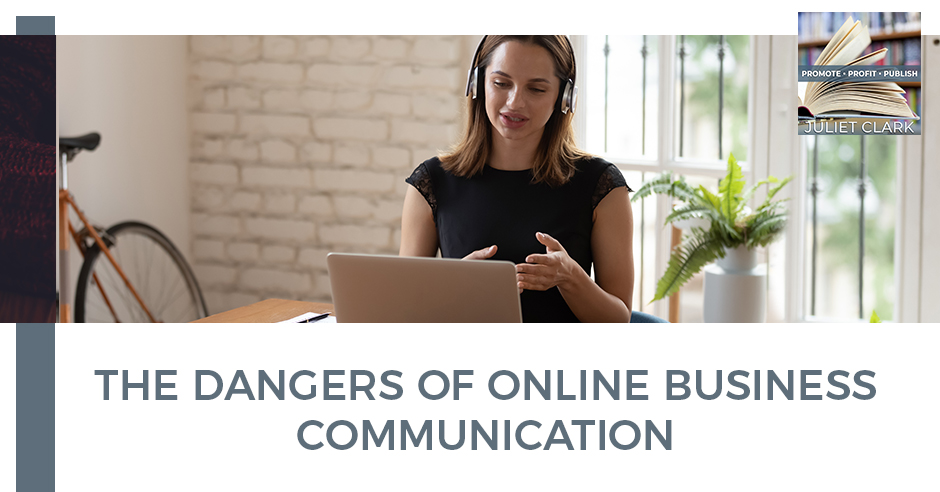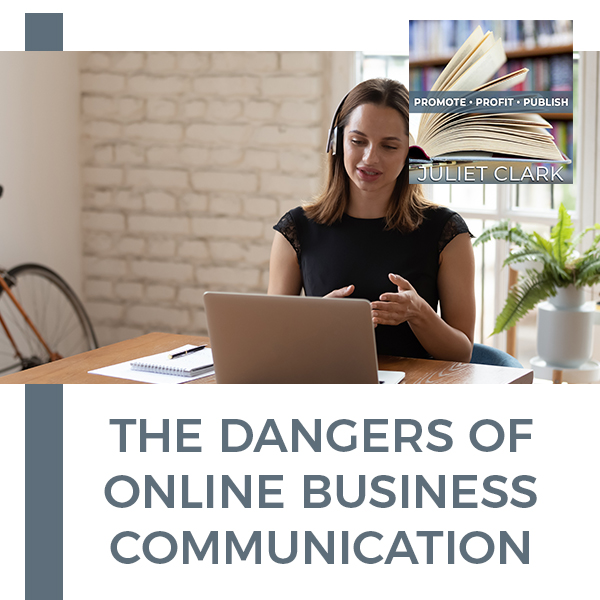
Remember that anything you write will reflect on your reputation and how you want to be perceived. Business communication in a world where everyone is online is a serious matter. Look what happened to Jon Gruden and his email leaks. Learn how to communicate safer with your host Juliet Clark and her guest Hanna Hasl-Kelchner. Hanna is the founder and CEO of Business M.O., LLC and the host of the Business Confidential Now podcast. Learn how to communicate online properly. Join in today’s episode to discover the dangers of venting through email.
—
Watch the episode here
Listen to the podcast here
The Dangers of Online Business Communication
An interesting conversation is going to take place in this episode. It’s a little bit different from what we normally do but something very relevant. I want to remind you to go over and follow us on YouTube. Subscribe to our YouTube channel, Superbrand Publishing. If you’re somebody who likes video instead of reading, you can see all the videos over there. You will see that Hanna is wearing a beautiful red sweater. She’s all dressed up for the holidays.
Also, don’t forget to go over and take our Promote, Profit, Publish Quiz. You can find that at www.PromoteProfitPublishQuiz.com. Find out if you’re ready to publish. Do you have all the pieces in place? Have you planned? Do you have a strategy? None of this can be done right off the cuff. You have to have plans for budgets and strategy.
Our guest is Hanna Hasl-Kelchner. She helps executives, managers and entrepreneurs build healthier business cultures that contribute to happier employees, improved employee retention and a more robust bottom line. She’s a published author and a recognized expert in the field of business strategy who delights in helping clients conquer business issues hiding in plain view that mattered to their bottom line through her consulting work at Business M.O., LLC and her podcast, Business Confidential Now. Unlike other business consultants, she brings a unique perspective to the table due to her decades of experience in bridging the gap between business and law as a trusted advisor to influential decision-makers ranging from startups to the S&P 500, Big Tobacco and the White House.
—
Welcome. We’re excited to have you, Hanna.
It’s great to be here. Thank you for having me. I’m looking forward to our conversation.
I invited Hanna to the show because we happened to be talking on the day that the Jon Gruden story broke. Everybody needs to understand what’s going on in their business and how smoking guns can impact your career. Hanna, tell us a little bit about that backstory. What would have been your advice?
Remember that everything you write as an employee is a business document. Share on XI like to give proactive advice and tell employees and their employers that the best thing to do is to remember that everything you write as an employee is a business document. It reflects not only on you personally but on the employer as well, which is why I can understand some people that we’re writing about that Jon Gruden story at the time was saying, “It was off-brand for the Raiders.” It was but there’s a disconnect between the value of an employee who expresses themselves that way and the franchise that they’re working for.
These emails came to light after a ten-month investigation into the NFL and it’s sad. My question to him would be, “Why did you have to write that? What were you thinking? How was that helping anyone? What purpose was it for?” He paid a heavy price and employees need to remember that. If you’re a solopreneur, it’s easier in a way but the downside that you have to keep remembering is you’re communicating with people whether you’re an author in publishing. You always have to keep in mind how your correspondence is being perceived. That’s not to say everybody has to be a perfect angel. We all get frustrated and angry about things and we want to vent.
The question is, how do you do it and which communication media is best suited for that? Email is not because it has legs and a lot of longevity. People keep and print it. It gets forwarded, gets into the wrong hands and goes beyond your intended audience sometimes. When you want to vent or say something that’s not very nice, ask yourself, “How is this helping? Who is it helping?” If you’re looking to commiserate with someone that you think has the same sentiment or feeling, there’s a better way to do that. It can be over a beer, a cup of coffee, a glass of wine or whatever your favorite libation is where you can vent with each other and hopefully nobody’s overhearing or recording you on your cell phone.
Even as a solopreneur, I feel like I have to be careful of what I send out. It’s not that anything I send out is so important but we’ve seen a lot where old things have resurfaced on Twitter and at the time you wrote it, you might not necessarily be thinking that it’s a bad thing but all of a sudden, that person on the other end of you have a row of some sort and they might be a little bit vindictive. We always have to be aware of what we’re writing in any context.

Business Communication: If you’re a solopreneur, you have to keep in mind that all the things you write will reflect on your reputation and how you want to be perceived.
You could try to explain the context away. Some people try to hide behind the First Amendment saying, “I have a right to say.” You also have a right to all the consequences that come with it so be smart. You have 100% control at the time you’re writing or communicating with somebody as to what you’re saying and how you’re saying it. That doesn’t mean holding hands, toasting marshmallows or singing kumbaya. People have tough conversations and that’s fine but there’s a way to do it. There’s a way to disagree without being disagreeable. Try to keep things in context.
I’ll give you an example. Humor does not always travel well. One thing that somebody thinks, “That’s hysterical,” somebody else is highly offended by. You need to be professional in your business correspondence and even your correspondence. When people are applying for a job, employers will have somebody look at their social media.
If there is something that could be troublesome for the company in terms of, “If this is how this person is speaking, they could be doing this on our behalf.” As agents of the organization, that reflects on us. Is that something we want? Is that something we can correct and draw their attention to and say you can do better? This does not allow you to shine professionally. Some people are open to that kind of feedback and others are not but it is something that employers look at. Even in your social media, be smart.
Not only be smart. One of the things I jumped off of Facebook in 2020 was political. Twitter is the worst thing that ever happened to this planet. I look at some of the things where people are so judgmental and attack other people on Twitter. What comes to mind for me is Alex Baldwin making a very judgmental comment about an accidental shooting and here he is. That tweet did not age well because he’s in that person’s shoes. What are the ramifications of that? You would think you’re exercising your First Amendment right but you’re being very antagonistic. Would you want that person to be a part of your culture?
It takes a level of maturity to disengage and stop pouring gas on the fire. Share on XIt depends if that is part of your culture. There are some organizations whose face is their brand. It may not be yours or mine but there could be a fit. You raise a very good point about being judgmental. It’s one thing to say in an employment situation like, “That employee is lazy. They need to be fired.” You put that in an email but it’s a lot more persuasive and powerful if you were to say, “That employee is consistently late meeting deadlines and late to work.” Why did you draw that conclusion? Allow other people to have the same bits of information to see if they draw the same conclusion.
This goes way back but I saw a case where a doctor wrote in the notes for a patient’s records, “Patient circling the drain.” Maybe some people think that’s funny and I’m sure that the doctor encounters lots of situations where somebody is at the end of life but that document came out in the course of a medical malpractice case so somebody had some explaining to do. Why set yourself up for those types of things when you don’t have to? It’s not necessary. Simply pointing to the factors of why they drew that conclusion allows others to draw that conclusion as well.
Communication is very important sticking to business. What else do you see in the workplace? It has been a detriment. The Gruden thing was enlightening because he wasn’t even part of the organization that he got fired from. Where do these things lead with things like that? You’re pretty versed in the law here.
He did wind up resigning as head coach so it cost him his job. Others say, “There were other people who wrote even worse stuff and that didn’t come to light.” There may be some politics behind the scenes that we’re not privy to as to why that particular thing happened but if you’re interested in protecting your career, especially advancing in your career or even as a solopreneur advancing, keep in mind that all of these things that you write, how you write them and what you say reflects on your reputation and how you want to be perceived.

Business Communication: Everyone needs to take responsibility for what they post. These days, people can hide behind an anonymous screen name and feel protected.
If you want to be perceived as a hard-ass then write a certain way. If you want to be perceived as taking the high road and someone that protects confidence, demonstrates respect and operates with decency and empathy, even if they don’t disagree with somebody’s position or how they present themselves then fine. That’s another way to do that. It’s not that maybe deep down inside you don’t harbor resentment or a bias. We all have different types of biases but does it mean you have to express it or express it in that form where it comes back to bite you? You’ve got 100% control and you decide how you want to show up.
I believe that social media has brought us into a world where we think our opinion matters to everyone else and we’re shocked when it doesn’t. I don’t know how better to say that but when you look at all the attacking that goes on in social media sometimes it’s innocent comments. When is that point where people start to take responsibility for their communication and the other side takes it for theirs as well? I truly believe that we all have to separate here and take responsibility for our communication.
We do need to take responsibility but when people can hide behind an anonymous screen name and a screen, they feel that they’ve got this level of protection. They’re like, “Everybody else is doing it so why not?” There’s this sense of needing to score points and win. It takes a level of maturity to disengage and not even respond to some of these things because it keeps pouring gas on the fire. Some people even say that social media has hurt our ability to be empathetic.
I often have to stop when I used to see those little wars going on. I got off Twitter in 2016 and Facebook in 2020. You can see it correlated with political things going on in the world that there was this level of meanness. What I was going to say with that is you have to stop and say, “Would I say that to this person if we were face-to-face?” That’s a big question when you’re talking behind the anonymous keyboard. We don’t even know if it’s anonymous people behind the keyboard or bots. A bot would never have empathy. We don’t know who we’re talking to sometimes.
There's a way to disagree without being disagreeable. Share on XIt also matters what their political affiliation or hidden agenda is. That’s very true. I would like to think that people’s time is more valuable than engaging in these types of spitting contests. It’s like the schoolyard where bullying takes place. Who wins and why does it matter? Who else is going to see it? Especially on something like Twitter, where the feeds are so quick. Unless somebody is seeing it in real-time or following it for a particular reason. It’s gone. How is this helpful? Those are the questions I keep coming back to when people engage in those types of correspondence. Is it to make themselves feel better? Is it their ego? Do they have to come out ahead? Does it matter that much to them to be right? Whether they’re right or not, if the other person doesn’t agree, it’s like, “Next.”
Going back to the empathy, I saw something on the news about the parade that there were a lot of casualties and a democratic operative came out saying, “It’s karma. You deserve this.” Where did we devolve in our communication where we tell people who have been victimized, “You deserve this.” I don’t know how we devolve to this point. We used to be very polite. That has served us much better than this complete nastiness.
It’s about being respectful. If you respectfully disagree with someone then fine. Explain why. They may or may not agree with your facts or interpretation of them. You’ll have an honest disagreement but when you start to attack people personally and on the level that you described, what good comes of it?
Hanna, where can we find you? This has been great. We didn’t even have to agree to disagree. We agreed.
We both like to see people put their best foot forward so that they can advance and help other people, which is what it’s about. It’s doing good. I have a podcast and it’s called Business Confidential Now. It’s about the stuff they don’t teach you in business school and there is a lot. It comes through experience. I interview a lot of experts, authors and thought leaders so that they can share their tips about what they learned and provide with their clients. We’re talking about big businesses that pay big bucks so you get it for free. It’s available anywhere that’s streaming podcasts and it’s BusinessConfidentialRadio.com.
Thank you so much for being on this episode.
Thank you for having me. This has been fun, Juliet. I appreciate it.
Important Links
- Superbrand Publishing – YouTube Channel
- www.PromoteProfitPublishQuiz.com
- Business M.O., LLC
- Business Confidential Now
- Hanna – LinkedIn
About Hanna Hasl-Kelchner
 Hanna Hasl-Kelchner helps executives, managers and entrepreneurs build healthier business cultures that contribute to happier employees, improved employee retention and a more robust bottom line. She is a published author and a recognized expert in the field of business strategy who delights in helping clients conquer business issues hiding in plain view that matter to their bottom line through her consulting work at Business M.O., LLC and her podcast, Business Confidential Now. Unlike other business consultants, Hanna brings a unique perspective to the table due to her decades of experience bridging the gap between business and law as a trusted advisor to influential decision makers ranging from startups, to the S&P 500, Big Tobacco and the White House.
Hanna Hasl-Kelchner helps executives, managers and entrepreneurs build healthier business cultures that contribute to happier employees, improved employee retention and a more robust bottom line. She is a published author and a recognized expert in the field of business strategy who delights in helping clients conquer business issues hiding in plain view that matter to their bottom line through her consulting work at Business M.O., LLC and her podcast, Business Confidential Now. Unlike other business consultants, Hanna brings a unique perspective to the table due to her decades of experience bridging the gap between business and law as a trusted advisor to influential decision makers ranging from startups, to the S&P 500, Big Tobacco and the White House.









Leave A Comment